Argumentative Essay: Legalizing Illegal Drugs in Canada (HSCI 1180)
VerifiedAdded on 2022/08/25
|11
|3088
|26
Essay
AI Summary
This argumentative essay, written for a HSCI 1180 course at a Canadian university, makes a case for the legalization of all illegal drugs in Canada. The author begins by highlighting the current issues related to drug use, including health consequences and economic impacts. The essay then argues that legalization would reduce illegal drug trafficking and associated crimes, boost the Canadian economy through taxation, and allow the government to reallocate resources currently spent on enforcement. The author also addresses concerns about increased drug use, referencing the legalization of cannabis in Canada as an example. The essay concludes with a reflection on the author's perspective, informed by research and personal experience. The essay is structured with an introduction, body paragraphs discussing the arguments, and a conclusion summarizing the key points. The author supports the arguments with references to various sources and statistics.
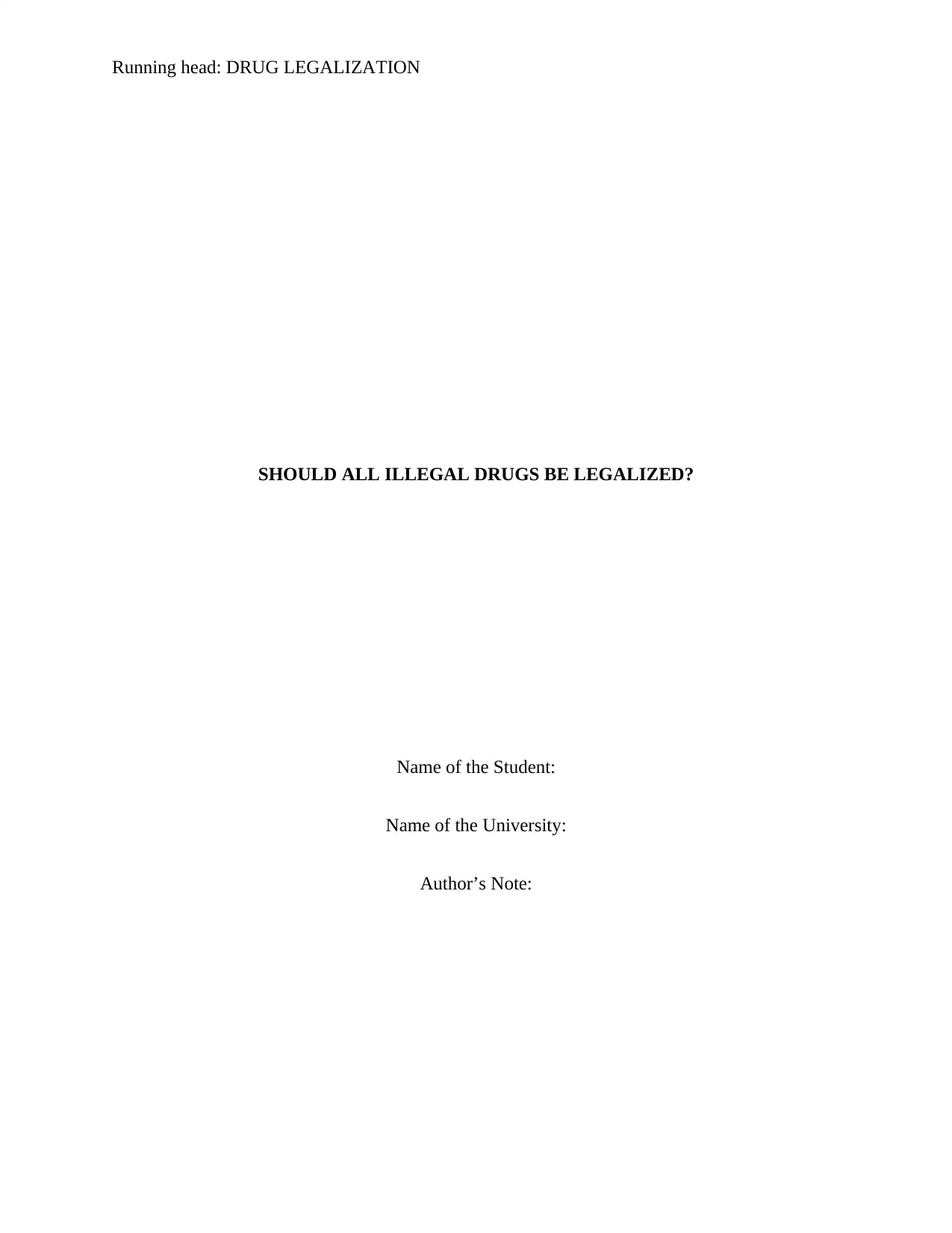
Running head: DRUG LEGALIZATION
SHOULD ALL ILLEGAL DRUGS BE LEGALIZED?
Name of the Student:
Name of the University:
Author’s Note:
SHOULD ALL ILLEGAL DRUGS BE LEGALIZED?
Name of the Student:
Name of the University:
Author’s Note:
Paraphrase This Document
Need a fresh take? Get an instant paraphrase of this document with our AI Paraphraser
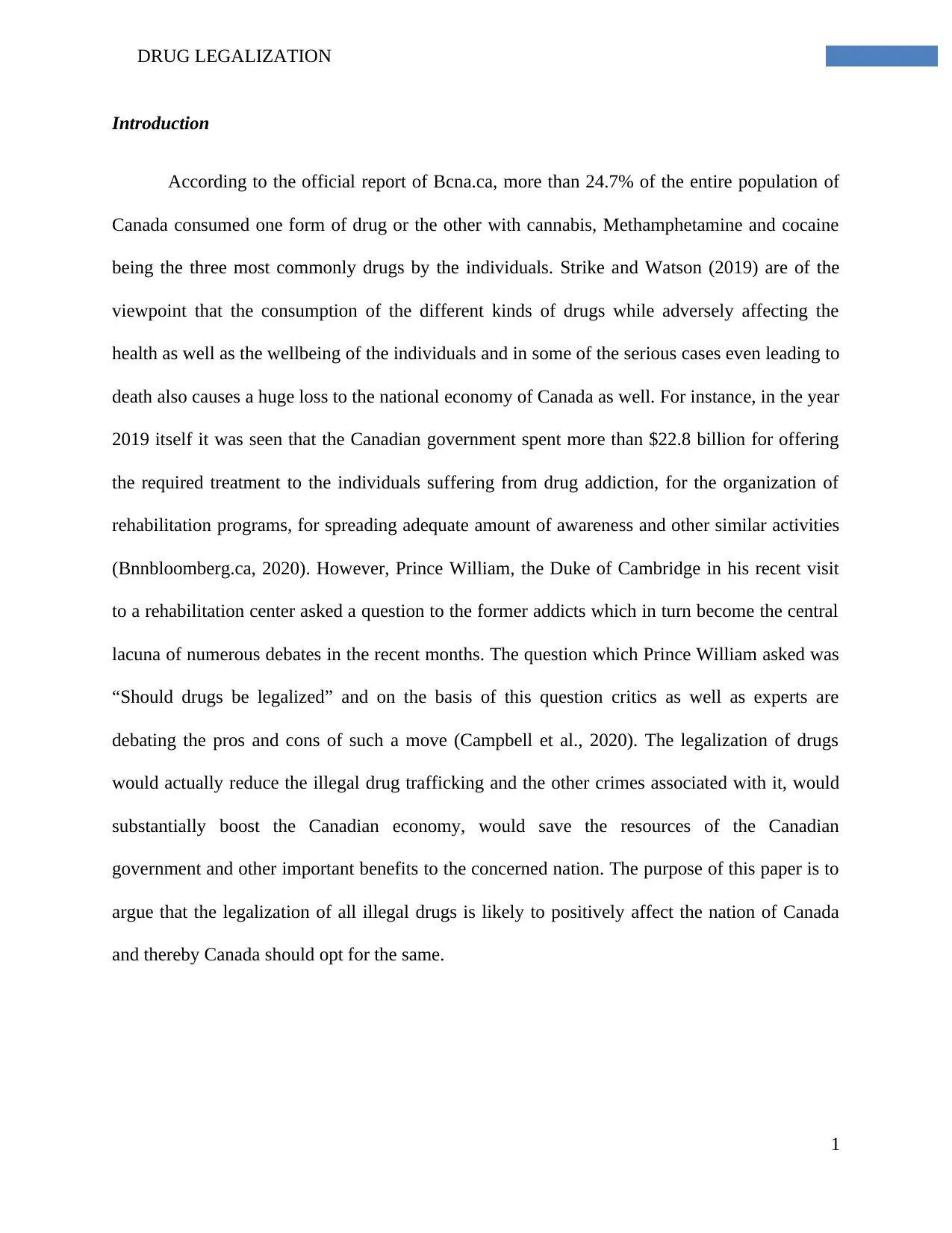
DRUG LEGALIZATION
Introduction
According to the official report of Bcna.ca, more than 24.7% of the entire population of
Canada consumed one form of drug or the other with cannabis, Methamphetamine and cocaine
being the three most commonly drugs by the individuals. Strike and Watson (2019) are of the
viewpoint that the consumption of the different kinds of drugs while adversely affecting the
health as well as the wellbeing of the individuals and in some of the serious cases even leading to
death also causes a huge loss to the national economy of Canada as well. For instance, in the year
2019 itself it was seen that the Canadian government spent more than $22.8 billion for offering
the required treatment to the individuals suffering from drug addiction, for the organization of
rehabilitation programs, for spreading adequate amount of awareness and other similar activities
(Bnnbloomberg.ca, 2020). However, Prince William, the Duke of Cambridge in his recent visit
to a rehabilitation center asked a question to the former addicts which in turn become the central
lacuna of numerous debates in the recent months. The question which Prince William asked was
“Should drugs be legalized” and on the basis of this question critics as well as experts are
debating the pros and cons of such a move (Campbell et al., 2020). The legalization of drugs
would actually reduce the illegal drug trafficking and the other crimes associated with it, would
substantially boost the Canadian economy, would save the resources of the Canadian
government and other important benefits to the concerned nation. The purpose of this paper is to
argue that the legalization of all illegal drugs is likely to positively affect the nation of Canada
and thereby Canada should opt for the same.
1
Introduction
According to the official report of Bcna.ca, more than 24.7% of the entire population of
Canada consumed one form of drug or the other with cannabis, Methamphetamine and cocaine
being the three most commonly drugs by the individuals. Strike and Watson (2019) are of the
viewpoint that the consumption of the different kinds of drugs while adversely affecting the
health as well as the wellbeing of the individuals and in some of the serious cases even leading to
death also causes a huge loss to the national economy of Canada as well. For instance, in the year
2019 itself it was seen that the Canadian government spent more than $22.8 billion for offering
the required treatment to the individuals suffering from drug addiction, for the organization of
rehabilitation programs, for spreading adequate amount of awareness and other similar activities
(Bnnbloomberg.ca, 2020). However, Prince William, the Duke of Cambridge in his recent visit
to a rehabilitation center asked a question to the former addicts which in turn become the central
lacuna of numerous debates in the recent months. The question which Prince William asked was
“Should drugs be legalized” and on the basis of this question critics as well as experts are
debating the pros and cons of such a move (Campbell et al., 2020). The legalization of drugs
would actually reduce the illegal drug trafficking and the other crimes associated with it, would
substantially boost the Canadian economy, would save the resources of the Canadian
government and other important benefits to the concerned nation. The purpose of this paper is to
argue that the legalization of all illegal drugs is likely to positively affect the nation of Canada
and thereby Canada should opt for the same.
1
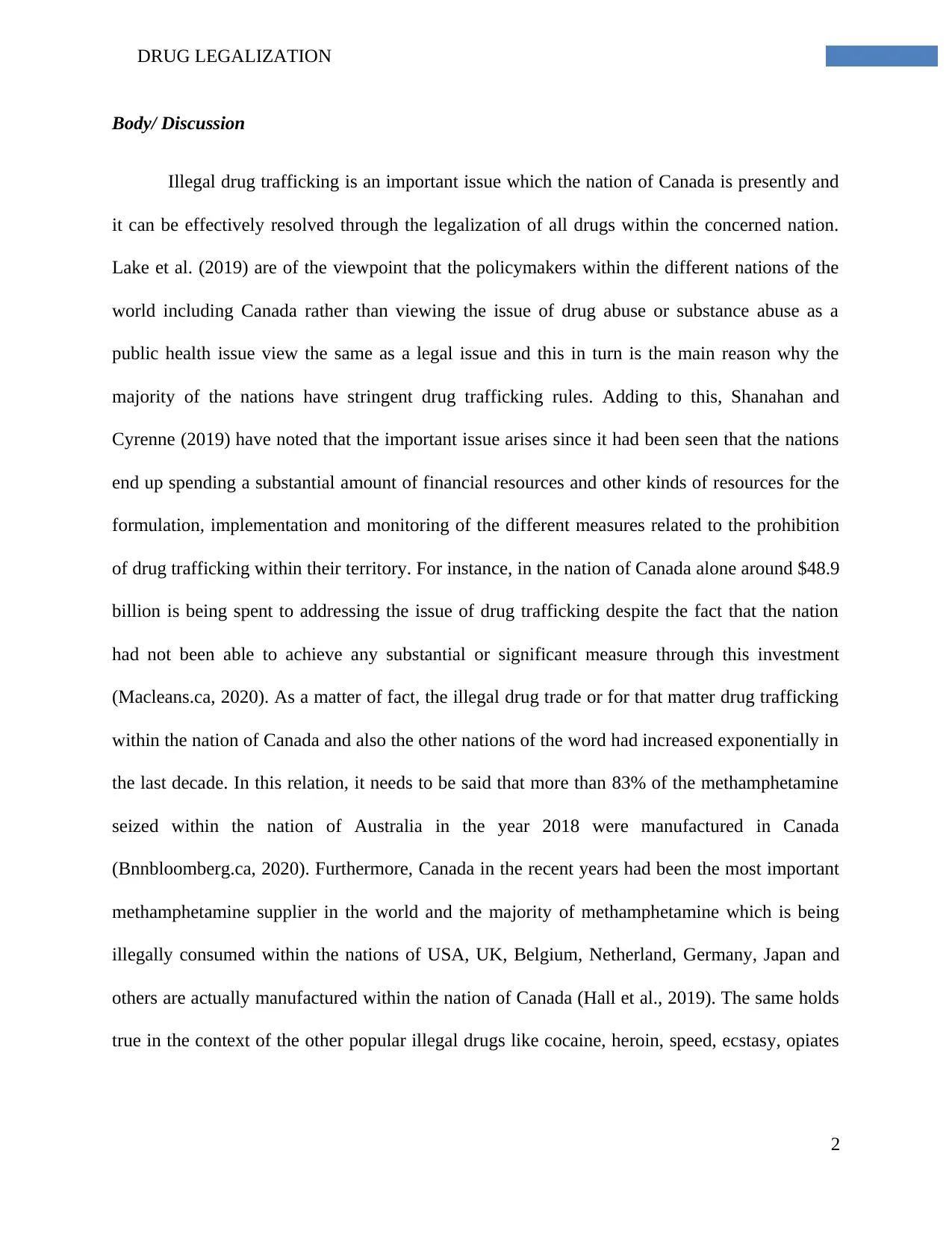
DRUG LEGALIZATION
Body/ Discussion
Illegal drug trafficking is an important issue which the nation of Canada is presently and
it can be effectively resolved through the legalization of all drugs within the concerned nation.
Lake et al. (2019) are of the viewpoint that the policymakers within the different nations of the
world including Canada rather than viewing the issue of drug abuse or substance abuse as a
public health issue view the same as a legal issue and this in turn is the main reason why the
majority of the nations have stringent drug trafficking rules. Adding to this, Shanahan and
Cyrenne (2019) have noted that the important issue arises since it had been seen that the nations
end up spending a substantial amount of financial resources and other kinds of resources for the
formulation, implementation and monitoring of the different measures related to the prohibition
of drug trafficking within their territory. For instance, in the nation of Canada alone around $48.9
billion is being spent to addressing the issue of drug trafficking despite the fact that the nation
had not been able to achieve any substantial or significant measure through this investment
(Macleans.ca, 2020). As a matter of fact, the illegal drug trade or for that matter drug trafficking
within the nation of Canada and also the other nations of the word had increased exponentially in
the last decade. In this relation, it needs to be said that more than 83% of the methamphetamine
seized within the nation of Australia in the year 2018 were manufactured in Canada
(Bnnbloomberg.ca, 2020). Furthermore, Canada in the recent years had been the most important
methamphetamine supplier in the world and the majority of methamphetamine which is being
illegally consumed within the nations of USA, UK, Belgium, Netherland, Germany, Japan and
others are actually manufactured within the nation of Canada (Hall et al., 2019). The same holds
true in the context of the other popular illegal drugs like cocaine, heroin, speed, ecstasy, opiates
2
Body/ Discussion
Illegal drug trafficking is an important issue which the nation of Canada is presently and
it can be effectively resolved through the legalization of all drugs within the concerned nation.
Lake et al. (2019) are of the viewpoint that the policymakers within the different nations of the
world including Canada rather than viewing the issue of drug abuse or substance abuse as a
public health issue view the same as a legal issue and this in turn is the main reason why the
majority of the nations have stringent drug trafficking rules. Adding to this, Shanahan and
Cyrenne (2019) have noted that the important issue arises since it had been seen that the nations
end up spending a substantial amount of financial resources and other kinds of resources for the
formulation, implementation and monitoring of the different measures related to the prohibition
of drug trafficking within their territory. For instance, in the nation of Canada alone around $48.9
billion is being spent to addressing the issue of drug trafficking despite the fact that the nation
had not been able to achieve any substantial or significant measure through this investment
(Macleans.ca, 2020). As a matter of fact, the illegal drug trade or for that matter drug trafficking
within the nation of Canada and also the other nations of the word had increased exponentially in
the last decade. In this relation, it needs to be said that more than 83% of the methamphetamine
seized within the nation of Australia in the year 2018 were manufactured in Canada
(Bnnbloomberg.ca, 2020). Furthermore, Canada in the recent years had been the most important
methamphetamine supplier in the world and the majority of methamphetamine which is being
illegally consumed within the nations of USA, UK, Belgium, Netherland, Germany, Japan and
others are actually manufactured within the nation of Canada (Hall et al., 2019). The same holds
true in the context of the other popular illegal drugs like cocaine, heroin, speed, ecstasy, opiates
2
⊘ This is a preview!⊘
Do you want full access?
Subscribe today to unlock all pages.

Trusted by 1+ million students worldwide
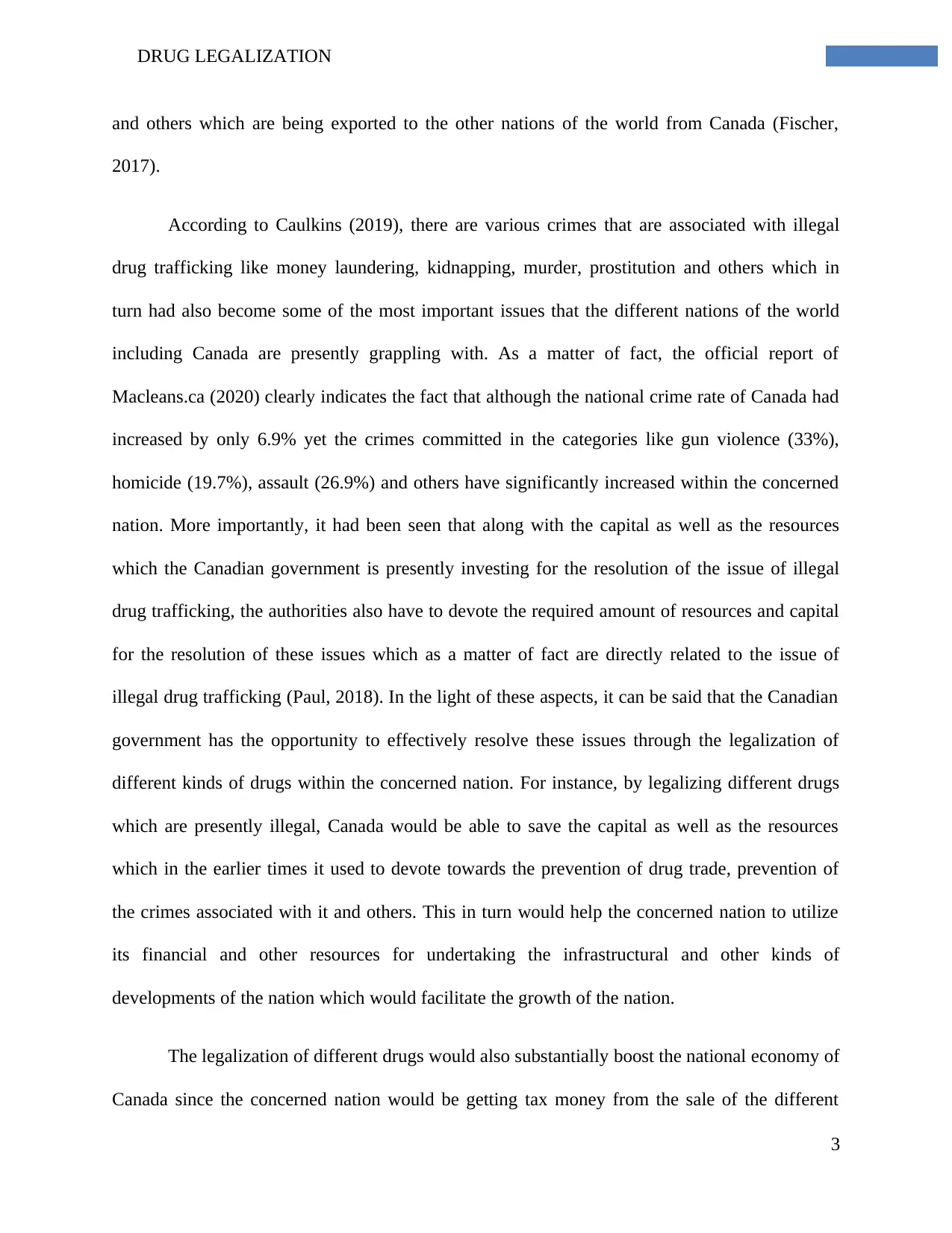
DRUG LEGALIZATION
and others which are being exported to the other nations of the world from Canada (Fischer,
2017).
According to Caulkins (2019), there are various crimes that are associated with illegal
drug trafficking like money laundering, kidnapping, murder, prostitution and others which in
turn had also become some of the most important issues that the different nations of the world
including Canada are presently grappling with. As a matter of fact, the official report of
Macleans.ca (2020) clearly indicates the fact that although the national crime rate of Canada had
increased by only 6.9% yet the crimes committed in the categories like gun violence (33%),
homicide (19.7%), assault (26.9%) and others have significantly increased within the concerned
nation. More importantly, it had been seen that along with the capital as well as the resources
which the Canadian government is presently investing for the resolution of the issue of illegal
drug trafficking, the authorities also have to devote the required amount of resources and capital
for the resolution of these issues which as a matter of fact are directly related to the issue of
illegal drug trafficking (Paul, 2018). In the light of these aspects, it can be said that the Canadian
government has the opportunity to effectively resolve these issues through the legalization of
different kinds of drugs within the concerned nation. For instance, by legalizing different drugs
which are presently illegal, Canada would be able to save the capital as well as the resources
which in the earlier times it used to devote towards the prevention of drug trade, prevention of
the crimes associated with it and others. This in turn would help the concerned nation to utilize
its financial and other resources for undertaking the infrastructural and other kinds of
developments of the nation which would facilitate the growth of the nation.
The legalization of different drugs would also substantially boost the national economy of
Canada since the concerned nation would be getting tax money from the sale of the different
3
and others which are being exported to the other nations of the world from Canada (Fischer,
2017).
According to Caulkins (2019), there are various crimes that are associated with illegal
drug trafficking like money laundering, kidnapping, murder, prostitution and others which in
turn had also become some of the most important issues that the different nations of the world
including Canada are presently grappling with. As a matter of fact, the official report of
Macleans.ca (2020) clearly indicates the fact that although the national crime rate of Canada had
increased by only 6.9% yet the crimes committed in the categories like gun violence (33%),
homicide (19.7%), assault (26.9%) and others have significantly increased within the concerned
nation. More importantly, it had been seen that along with the capital as well as the resources
which the Canadian government is presently investing for the resolution of the issue of illegal
drug trafficking, the authorities also have to devote the required amount of resources and capital
for the resolution of these issues which as a matter of fact are directly related to the issue of
illegal drug trafficking (Paul, 2018). In the light of these aspects, it can be said that the Canadian
government has the opportunity to effectively resolve these issues through the legalization of
different kinds of drugs within the concerned nation. For instance, by legalizing different drugs
which are presently illegal, Canada would be able to save the capital as well as the resources
which in the earlier times it used to devote towards the prevention of drug trade, prevention of
the crimes associated with it and others. This in turn would help the concerned nation to utilize
its financial and other resources for undertaking the infrastructural and other kinds of
developments of the nation which would facilitate the growth of the nation.
The legalization of different drugs would also substantially boost the national economy of
Canada since the concerned nation would be getting tax money from the sale of the different
3
Paraphrase This Document
Need a fresh take? Get an instant paraphrase of this document with our AI Paraphraser
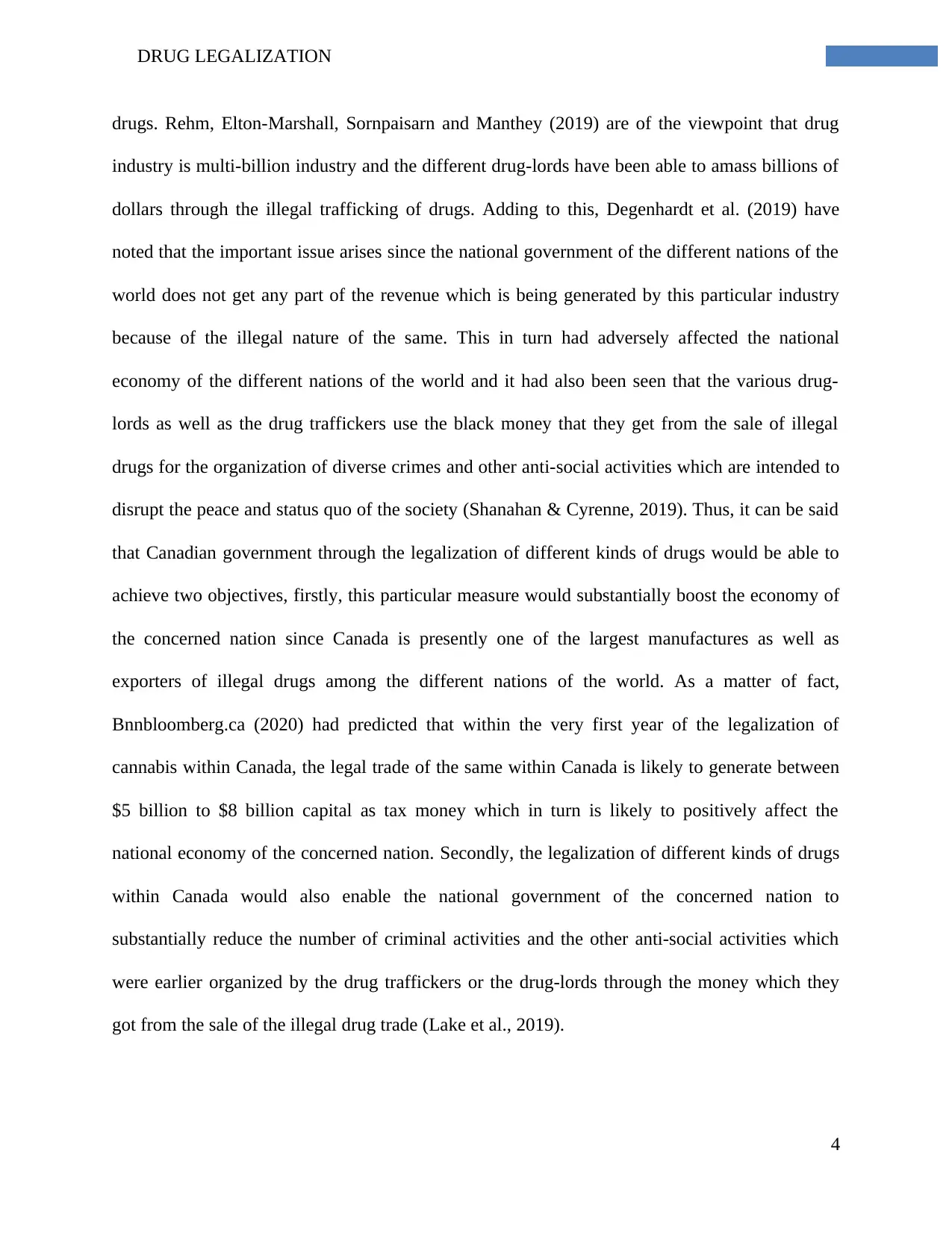
DRUG LEGALIZATION
drugs. Rehm, Elton-Marshall, Sornpaisarn and Manthey (2019) are of the viewpoint that drug
industry is multi-billion industry and the different drug-lords have been able to amass billions of
dollars through the illegal trafficking of drugs. Adding to this, Degenhardt et al. (2019) have
noted that the important issue arises since the national government of the different nations of the
world does not get any part of the revenue which is being generated by this particular industry
because of the illegal nature of the same. This in turn had adversely affected the national
economy of the different nations of the world and it had also been seen that the various drug-
lords as well as the drug traffickers use the black money that they get from the sale of illegal
drugs for the organization of diverse crimes and other anti-social activities which are intended to
disrupt the peace and status quo of the society (Shanahan & Cyrenne, 2019). Thus, it can be said
that Canadian government through the legalization of different kinds of drugs would be able to
achieve two objectives, firstly, this particular measure would substantially boost the economy of
the concerned nation since Canada is presently one of the largest manufactures as well as
exporters of illegal drugs among the different nations of the world. As a matter of fact,
Bnnbloomberg.ca (2020) had predicted that within the very first year of the legalization of
cannabis within Canada, the legal trade of the same within Canada is likely to generate between
$5 billion to $8 billion capital as tax money which in turn is likely to positively affect the
national economy of the concerned nation. Secondly, the legalization of different kinds of drugs
within Canada would also enable the national government of the concerned nation to
substantially reduce the number of criminal activities and the other anti-social activities which
were earlier organized by the drug traffickers or the drug-lords through the money which they
got from the sale of the illegal drug trade (Lake et al., 2019).
4
drugs. Rehm, Elton-Marshall, Sornpaisarn and Manthey (2019) are of the viewpoint that drug
industry is multi-billion industry and the different drug-lords have been able to amass billions of
dollars through the illegal trafficking of drugs. Adding to this, Degenhardt et al. (2019) have
noted that the important issue arises since the national government of the different nations of the
world does not get any part of the revenue which is being generated by this particular industry
because of the illegal nature of the same. This in turn had adversely affected the national
economy of the different nations of the world and it had also been seen that the various drug-
lords as well as the drug traffickers use the black money that they get from the sale of illegal
drugs for the organization of diverse crimes and other anti-social activities which are intended to
disrupt the peace and status quo of the society (Shanahan & Cyrenne, 2019). Thus, it can be said
that Canadian government through the legalization of different kinds of drugs would be able to
achieve two objectives, firstly, this particular measure would substantially boost the economy of
the concerned nation since Canada is presently one of the largest manufactures as well as
exporters of illegal drugs among the different nations of the world. As a matter of fact,
Bnnbloomberg.ca (2020) had predicted that within the very first year of the legalization of
cannabis within Canada, the legal trade of the same within Canada is likely to generate between
$5 billion to $8 billion capital as tax money which in turn is likely to positively affect the
national economy of the concerned nation. Secondly, the legalization of different kinds of drugs
within Canada would also enable the national government of the concerned nation to
substantially reduce the number of criminal activities and the other anti-social activities which
were earlier organized by the drug traffickers or the drug-lords through the money which they
got from the sale of the illegal drug trade (Lake et al., 2019).
4
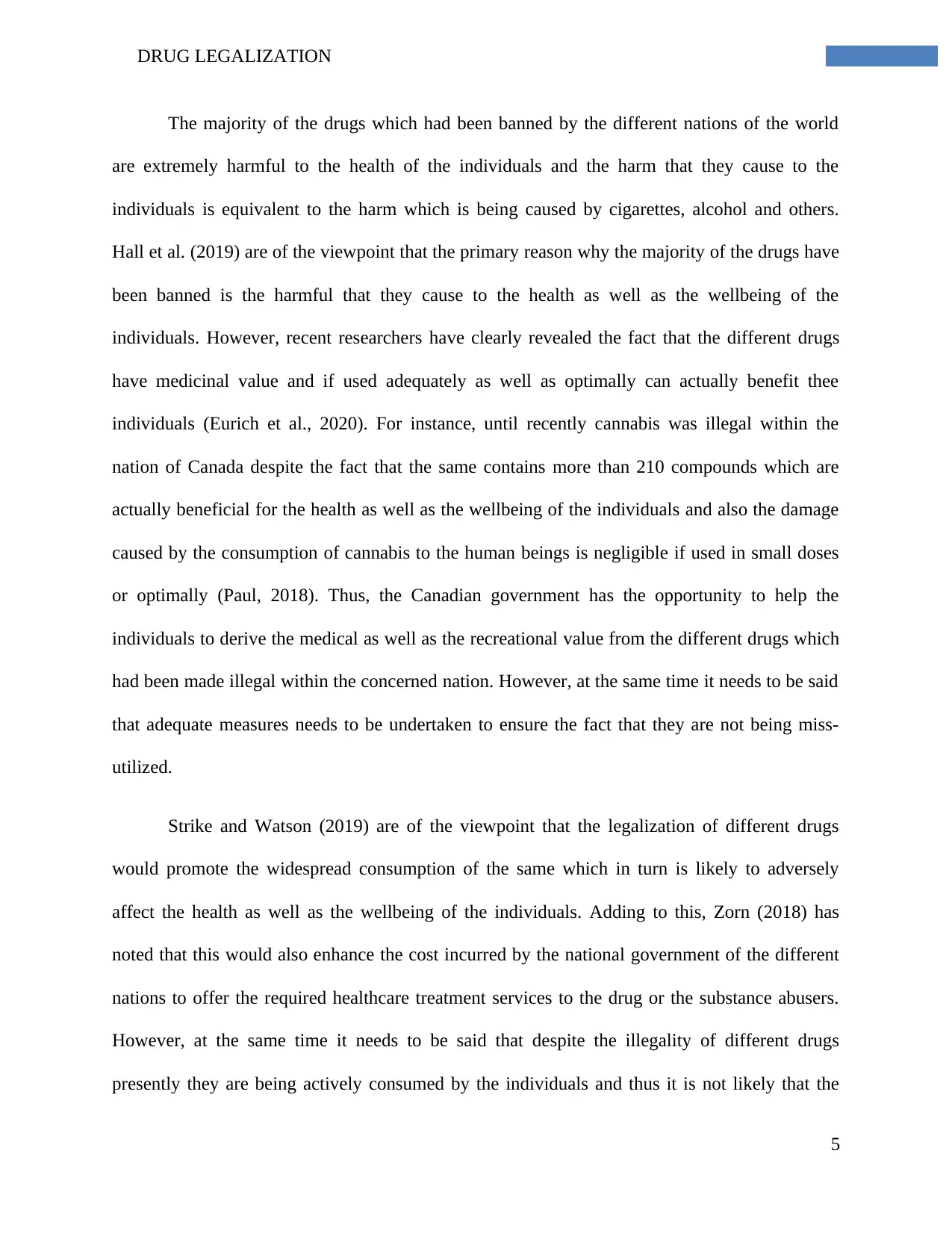
DRUG LEGALIZATION
The majority of the drugs which had been banned by the different nations of the world
are extremely harmful to the health of the individuals and the harm that they cause to the
individuals is equivalent to the harm which is being caused by cigarettes, alcohol and others.
Hall et al. (2019) are of the viewpoint that the primary reason why the majority of the drugs have
been banned is the harmful that they cause to the health as well as the wellbeing of the
individuals. However, recent researchers have clearly revealed the fact that the different drugs
have medicinal value and if used adequately as well as optimally can actually benefit thee
individuals (Eurich et al., 2020). For instance, until recently cannabis was illegal within the
nation of Canada despite the fact that the same contains more than 210 compounds which are
actually beneficial for the health as well as the wellbeing of the individuals and also the damage
caused by the consumption of cannabis to the human beings is negligible if used in small doses
or optimally (Paul, 2018). Thus, the Canadian government has the opportunity to help the
individuals to derive the medical as well as the recreational value from the different drugs which
had been made illegal within the concerned nation. However, at the same time it needs to be said
that adequate measures needs to be undertaken to ensure the fact that they are not being miss-
utilized.
Strike and Watson (2019) are of the viewpoint that the legalization of different drugs
would promote the widespread consumption of the same which in turn is likely to adversely
affect the health as well as the wellbeing of the individuals. Adding to this, Zorn (2018) has
noted that this would also enhance the cost incurred by the national government of the different
nations to offer the required healthcare treatment services to the drug or the substance abusers.
However, at the same time it needs to be said that despite the illegality of different drugs
presently they are being actively consumed by the individuals and thus it is not likely that the
5
The majority of the drugs which had been banned by the different nations of the world
are extremely harmful to the health of the individuals and the harm that they cause to the
individuals is equivalent to the harm which is being caused by cigarettes, alcohol and others.
Hall et al. (2019) are of the viewpoint that the primary reason why the majority of the drugs have
been banned is the harmful that they cause to the health as well as the wellbeing of the
individuals. However, recent researchers have clearly revealed the fact that the different drugs
have medicinal value and if used adequately as well as optimally can actually benefit thee
individuals (Eurich et al., 2020). For instance, until recently cannabis was illegal within the
nation of Canada despite the fact that the same contains more than 210 compounds which are
actually beneficial for the health as well as the wellbeing of the individuals and also the damage
caused by the consumption of cannabis to the human beings is negligible if used in small doses
or optimally (Paul, 2018). Thus, the Canadian government has the opportunity to help the
individuals to derive the medical as well as the recreational value from the different drugs which
had been made illegal within the concerned nation. However, at the same time it needs to be said
that adequate measures needs to be undertaken to ensure the fact that they are not being miss-
utilized.
Strike and Watson (2019) are of the viewpoint that the legalization of different drugs
would promote the widespread consumption of the same which in turn is likely to adversely
affect the health as well as the wellbeing of the individuals. Adding to this, Zorn (2018) has
noted that this would also enhance the cost incurred by the national government of the different
nations to offer the required healthcare treatment services to the drug or the substance abusers.
However, at the same time it needs to be said that despite the illegality of different drugs
presently they are being actively consumed by the individuals and thus it is not likely that the
5
⊘ This is a preview!⊘
Do you want full access?
Subscribe today to unlock all pages.

Trusted by 1+ million students worldwide
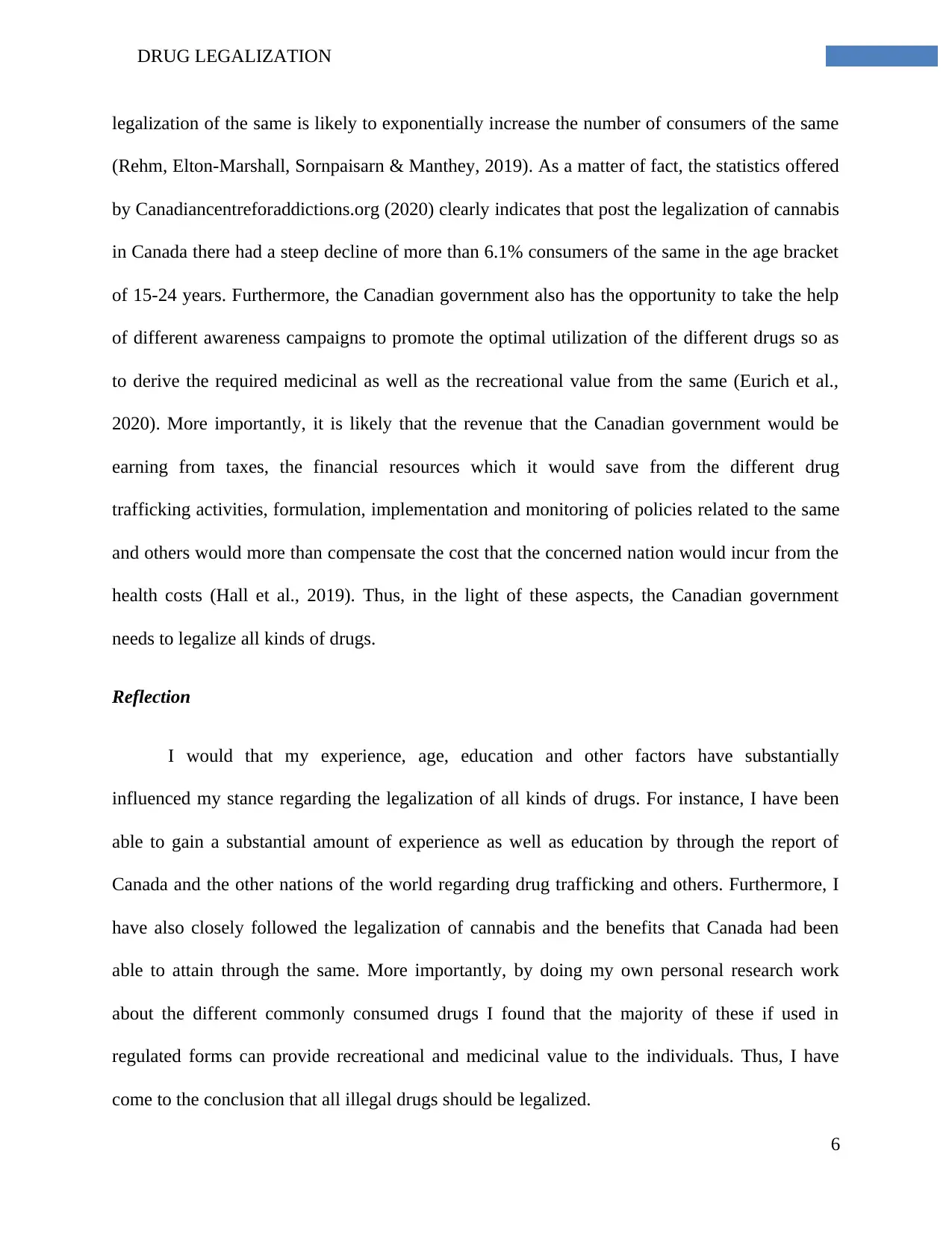
DRUG LEGALIZATION
legalization of the same is likely to exponentially increase the number of consumers of the same
(Rehm, Elton-Marshall, Sornpaisarn & Manthey, 2019). As a matter of fact, the statistics offered
by Canadiancentreforaddictions.org (2020) clearly indicates that post the legalization of cannabis
in Canada there had a steep decline of more than 6.1% consumers of the same in the age bracket
of 15-24 years. Furthermore, the Canadian government also has the opportunity to take the help
of different awareness campaigns to promote the optimal utilization of the different drugs so as
to derive the required medicinal as well as the recreational value from the same (Eurich et al.,
2020). More importantly, it is likely that the revenue that the Canadian government would be
earning from taxes, the financial resources which it would save from the different drug
trafficking activities, formulation, implementation and monitoring of policies related to the same
and others would more than compensate the cost that the concerned nation would incur from the
health costs (Hall et al., 2019). Thus, in the light of these aspects, the Canadian government
needs to legalize all kinds of drugs.
Reflection
I would that my experience, age, education and other factors have substantially
influenced my stance regarding the legalization of all kinds of drugs. For instance, I have been
able to gain a substantial amount of experience as well as education by through the report of
Canada and the other nations of the world regarding drug trafficking and others. Furthermore, I
have also closely followed the legalization of cannabis and the benefits that Canada had been
able to attain through the same. More importantly, by doing my own personal research work
about the different commonly consumed drugs I found that the majority of these if used in
regulated forms can provide recreational and medicinal value to the individuals. Thus, I have
come to the conclusion that all illegal drugs should be legalized.
6
legalization of the same is likely to exponentially increase the number of consumers of the same
(Rehm, Elton-Marshall, Sornpaisarn & Manthey, 2019). As a matter of fact, the statistics offered
by Canadiancentreforaddictions.org (2020) clearly indicates that post the legalization of cannabis
in Canada there had a steep decline of more than 6.1% consumers of the same in the age bracket
of 15-24 years. Furthermore, the Canadian government also has the opportunity to take the help
of different awareness campaigns to promote the optimal utilization of the different drugs so as
to derive the required medicinal as well as the recreational value from the same (Eurich et al.,
2020). More importantly, it is likely that the revenue that the Canadian government would be
earning from taxes, the financial resources which it would save from the different drug
trafficking activities, formulation, implementation and monitoring of policies related to the same
and others would more than compensate the cost that the concerned nation would incur from the
health costs (Hall et al., 2019). Thus, in the light of these aspects, the Canadian government
needs to legalize all kinds of drugs.
Reflection
I would that my experience, age, education and other factors have substantially
influenced my stance regarding the legalization of all kinds of drugs. For instance, I have been
able to gain a substantial amount of experience as well as education by through the report of
Canada and the other nations of the world regarding drug trafficking and others. Furthermore, I
have also closely followed the legalization of cannabis and the benefits that Canada had been
able to attain through the same. More importantly, by doing my own personal research work
about the different commonly consumed drugs I found that the majority of these if used in
regulated forms can provide recreational and medicinal value to the individuals. Thus, I have
come to the conclusion that all illegal drugs should be legalized.
6
Paraphrase This Document
Need a fresh take? Get an instant paraphrase of this document with our AI Paraphraser
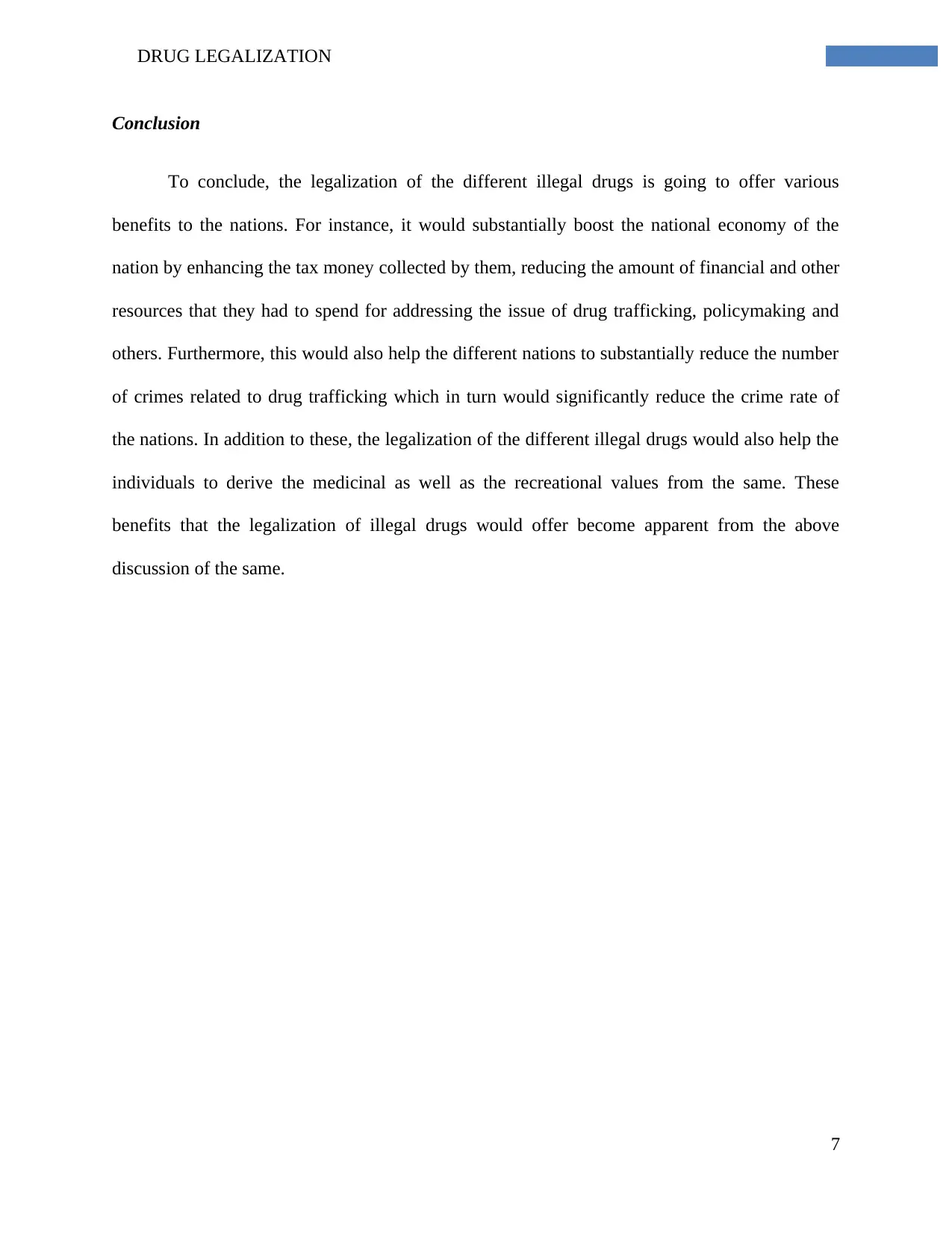
DRUG LEGALIZATION
Conclusion
To conclude, the legalization of the different illegal drugs is going to offer various
benefits to the nations. For instance, it would substantially boost the national economy of the
nation by enhancing the tax money collected by them, reducing the amount of financial and other
resources that they had to spend for addressing the issue of drug trafficking, policymaking and
others. Furthermore, this would also help the different nations to substantially reduce the number
of crimes related to drug trafficking which in turn would significantly reduce the crime rate of
the nations. In addition to these, the legalization of the different illegal drugs would also help the
individuals to derive the medicinal as well as the recreational values from the same. These
benefits that the legalization of illegal drugs would offer become apparent from the above
discussion of the same.
7
Conclusion
To conclude, the legalization of the different illegal drugs is going to offer various
benefits to the nations. For instance, it would substantially boost the national economy of the
nation by enhancing the tax money collected by them, reducing the amount of financial and other
resources that they had to spend for addressing the issue of drug trafficking, policymaking and
others. Furthermore, this would also help the different nations to substantially reduce the number
of crimes related to drug trafficking which in turn would significantly reduce the crime rate of
the nations. In addition to these, the legalization of the different illegal drugs would also help the
individuals to derive the medicinal as well as the recreational values from the same. These
benefits that the legalization of illegal drugs would offer become apparent from the above
discussion of the same.
7
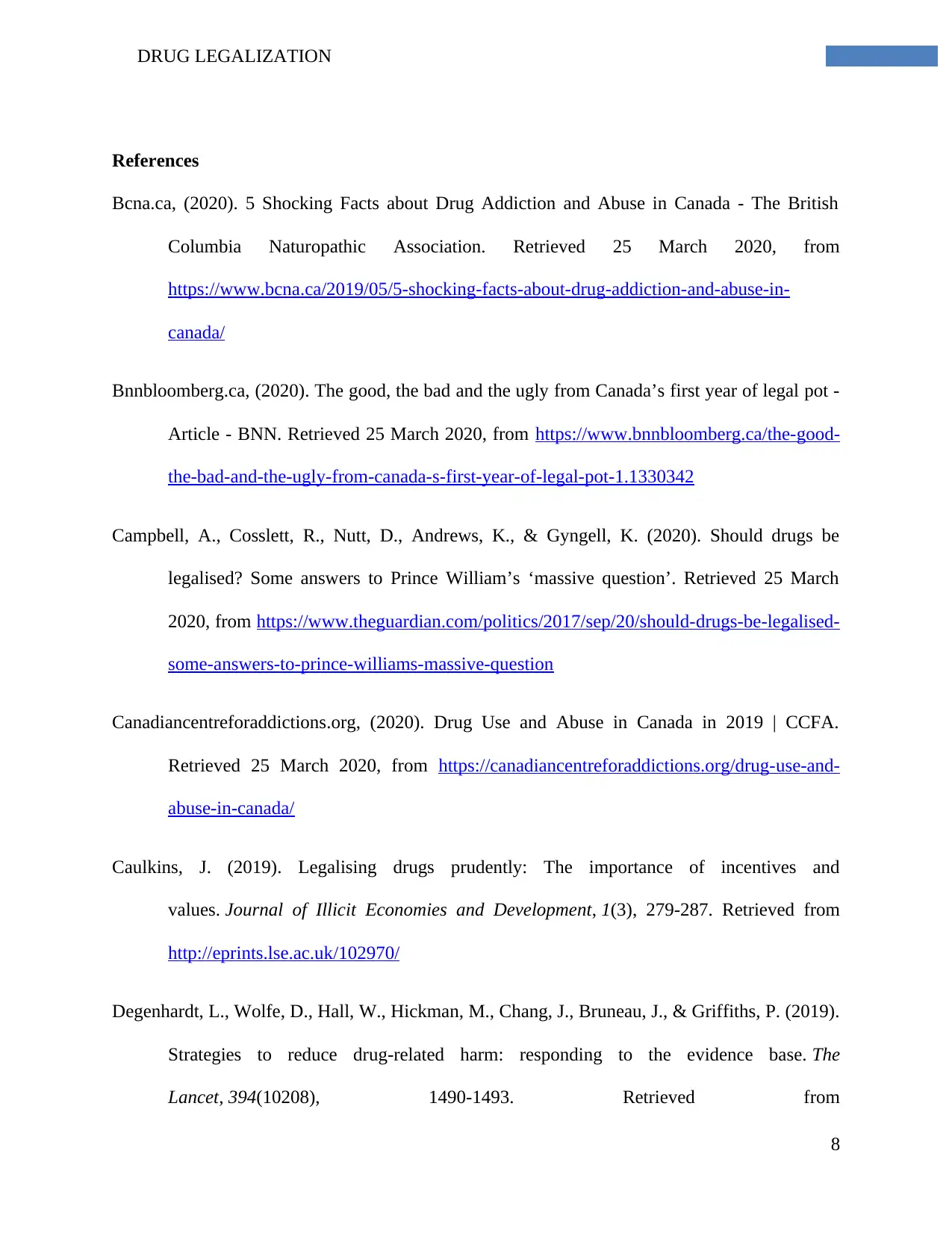
DRUG LEGALIZATION
References
Bcna.ca, (2020). 5 Shocking Facts about Drug Addiction and Abuse in Canada - The British
Columbia Naturopathic Association. Retrieved 25 March 2020, from
https://www.bcna.ca/2019/05/5-shocking-facts-about-drug-addiction-and-abuse-in-
canada/
Bnnbloomberg.ca, (2020). The good, the bad and the ugly from Canada’s first year of legal pot -
Article - BNN. Retrieved 25 March 2020, from https://www.bnnbloomberg.ca/the-good-
the-bad-and-the-ugly-from-canada-s-first-year-of-legal-pot-1.1330342
Campbell, A., Cosslett, R., Nutt, D., Andrews, K., & Gyngell, K. (2020). Should drugs be
legalised? Some answers to Prince William’s ‘massive question’. Retrieved 25 March
2020, from https://www.theguardian.com/politics/2017/sep/20/should-drugs-be-legalised-
some-answers-to-prince-williams-massive-question
Canadiancentreforaddictions.org, (2020). Drug Use and Abuse in Canada in 2019 | CCFA.
Retrieved 25 March 2020, from https://canadiancentreforaddictions.org/drug-use-and-
abuse-in-canada/
Caulkins, J. (2019). Legalising drugs prudently: The importance of incentives and
values. Journal of Illicit Economies and Development, 1(3), 279-287. Retrieved from
http://eprints.lse.ac.uk/102970/
Degenhardt, L., Wolfe, D., Hall, W., Hickman, M., Chang, J., Bruneau, J., & Griffiths, P. (2019).
Strategies to reduce drug-related harm: responding to the evidence base. The
Lancet, 394(10208), 1490-1493. Retrieved from
8
References
Bcna.ca, (2020). 5 Shocking Facts about Drug Addiction and Abuse in Canada - The British
Columbia Naturopathic Association. Retrieved 25 March 2020, from
https://www.bcna.ca/2019/05/5-shocking-facts-about-drug-addiction-and-abuse-in-
canada/
Bnnbloomberg.ca, (2020). The good, the bad and the ugly from Canada’s first year of legal pot -
Article - BNN. Retrieved 25 March 2020, from https://www.bnnbloomberg.ca/the-good-
the-bad-and-the-ugly-from-canada-s-first-year-of-legal-pot-1.1330342
Campbell, A., Cosslett, R., Nutt, D., Andrews, K., & Gyngell, K. (2020). Should drugs be
legalised? Some answers to Prince William’s ‘massive question’. Retrieved 25 March
2020, from https://www.theguardian.com/politics/2017/sep/20/should-drugs-be-legalised-
some-answers-to-prince-williams-massive-question
Canadiancentreforaddictions.org, (2020). Drug Use and Abuse in Canada in 2019 | CCFA.
Retrieved 25 March 2020, from https://canadiancentreforaddictions.org/drug-use-and-
abuse-in-canada/
Caulkins, J. (2019). Legalising drugs prudently: The importance of incentives and
values. Journal of Illicit Economies and Development, 1(3), 279-287. Retrieved from
http://eprints.lse.ac.uk/102970/
Degenhardt, L., Wolfe, D., Hall, W., Hickman, M., Chang, J., Bruneau, J., & Griffiths, P. (2019).
Strategies to reduce drug-related harm: responding to the evidence base. The
Lancet, 394(10208), 1490-1493. Retrieved from
8
⊘ This is a preview!⊘
Do you want full access?
Subscribe today to unlock all pages.

Trusted by 1+ million students worldwide
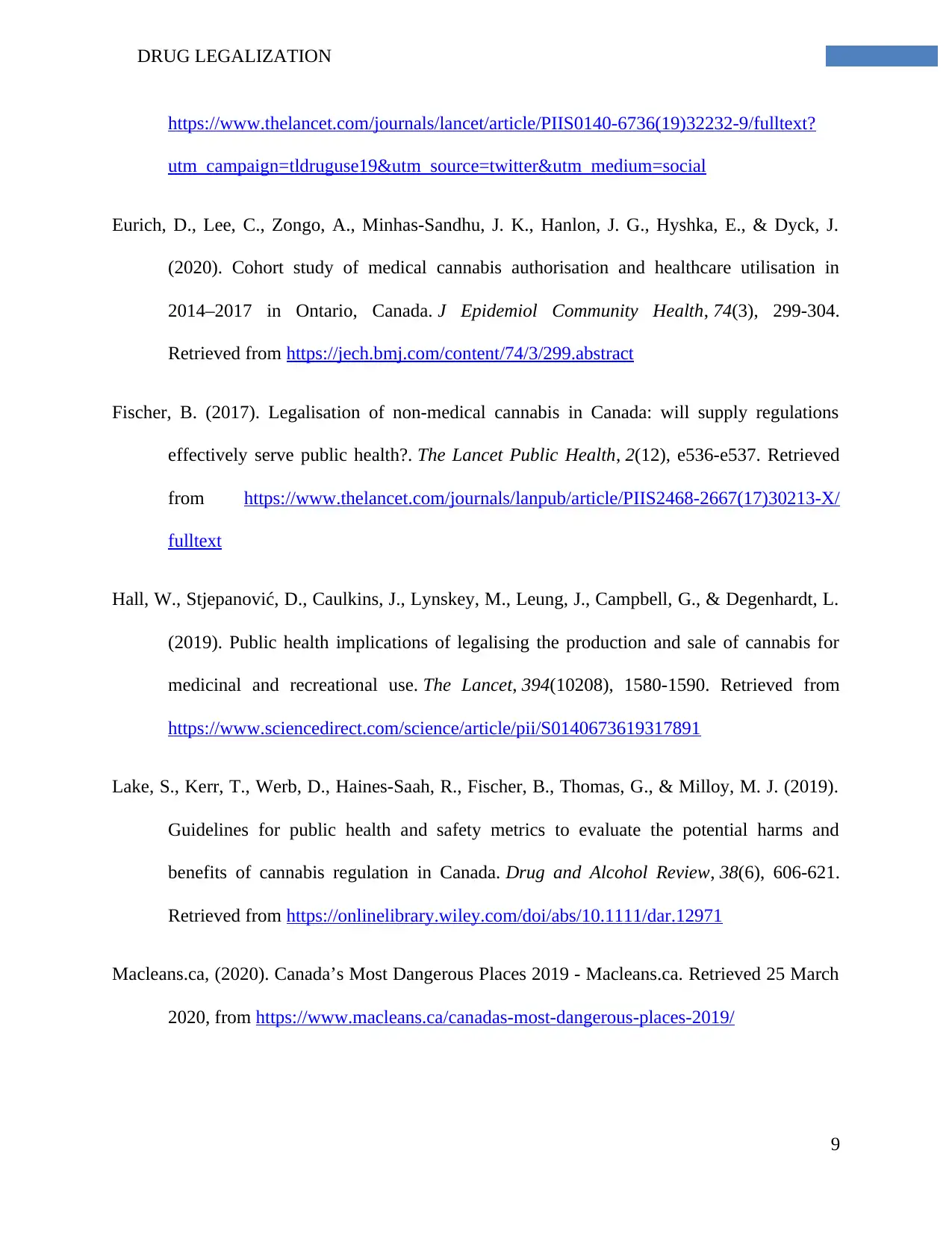
DRUG LEGALIZATION
https://www.thelancet.com/journals/lancet/article/PIIS0140-6736(19)32232-9/fulltext?
utm_campaign=tldruguse19&utm_source=twitter&utm_medium=social
Eurich, D., Lee, C., Zongo, A., Minhas-Sandhu, J. K., Hanlon, J. G., Hyshka, E., & Dyck, J.
(2020). Cohort study of medical cannabis authorisation and healthcare utilisation in
2014–2017 in Ontario, Canada. J Epidemiol Community Health, 74(3), 299-304.
Retrieved from https://jech.bmj.com/content/74/3/299.abstract
Fischer, B. (2017). Legalisation of non-medical cannabis in Canada: will supply regulations
effectively serve public health?. The Lancet Public Health, 2(12), e536-e537. Retrieved
from https://www.thelancet.com/journals/lanpub/article/PIIS2468-2667(17)30213-X/
fulltext
Hall, W., Stjepanović, D., Caulkins, J., Lynskey, M., Leung, J., Campbell, G., & Degenhardt, L.
(2019). Public health implications of legalising the production and sale of cannabis for
medicinal and recreational use. The Lancet, 394(10208), 1580-1590. Retrieved from
https://www.sciencedirect.com/science/article/pii/S0140673619317891
Lake, S., Kerr, T., Werb, D., Haines‐Saah, R., Fischer, B., Thomas, G., & Milloy, M. J. (2019).
Guidelines for public health and safety metrics to evaluate the potential harms and
benefits of cannabis regulation in Canada. Drug and Alcohol Review, 38(6), 606-621.
Retrieved from https://onlinelibrary.wiley.com/doi/abs/10.1111/dar.12971
Macleans.ca, (2020). Canada’s Most Dangerous Places 2019 - Macleans.ca. Retrieved 25 March
2020, from https://www.macleans.ca/canadas-most-dangerous-places-2019/
9
https://www.thelancet.com/journals/lancet/article/PIIS0140-6736(19)32232-9/fulltext?
utm_campaign=tldruguse19&utm_source=twitter&utm_medium=social
Eurich, D., Lee, C., Zongo, A., Minhas-Sandhu, J. K., Hanlon, J. G., Hyshka, E., & Dyck, J.
(2020). Cohort study of medical cannabis authorisation and healthcare utilisation in
2014–2017 in Ontario, Canada. J Epidemiol Community Health, 74(3), 299-304.
Retrieved from https://jech.bmj.com/content/74/3/299.abstract
Fischer, B. (2017). Legalisation of non-medical cannabis in Canada: will supply regulations
effectively serve public health?. The Lancet Public Health, 2(12), e536-e537. Retrieved
from https://www.thelancet.com/journals/lanpub/article/PIIS2468-2667(17)30213-X/
fulltext
Hall, W., Stjepanović, D., Caulkins, J., Lynskey, M., Leung, J., Campbell, G., & Degenhardt, L.
(2019). Public health implications of legalising the production and sale of cannabis for
medicinal and recreational use. The Lancet, 394(10208), 1580-1590. Retrieved from
https://www.sciencedirect.com/science/article/pii/S0140673619317891
Lake, S., Kerr, T., Werb, D., Haines‐Saah, R., Fischer, B., Thomas, G., & Milloy, M. J. (2019).
Guidelines for public health and safety metrics to evaluate the potential harms and
benefits of cannabis regulation in Canada. Drug and Alcohol Review, 38(6), 606-621.
Retrieved from https://onlinelibrary.wiley.com/doi/abs/10.1111/dar.12971
Macleans.ca, (2020). Canada’s Most Dangerous Places 2019 - Macleans.ca. Retrieved 25 March
2020, from https://www.macleans.ca/canadas-most-dangerous-places-2019/
9
Paraphrase This Document
Need a fresh take? Get an instant paraphrase of this document with our AI Paraphraser
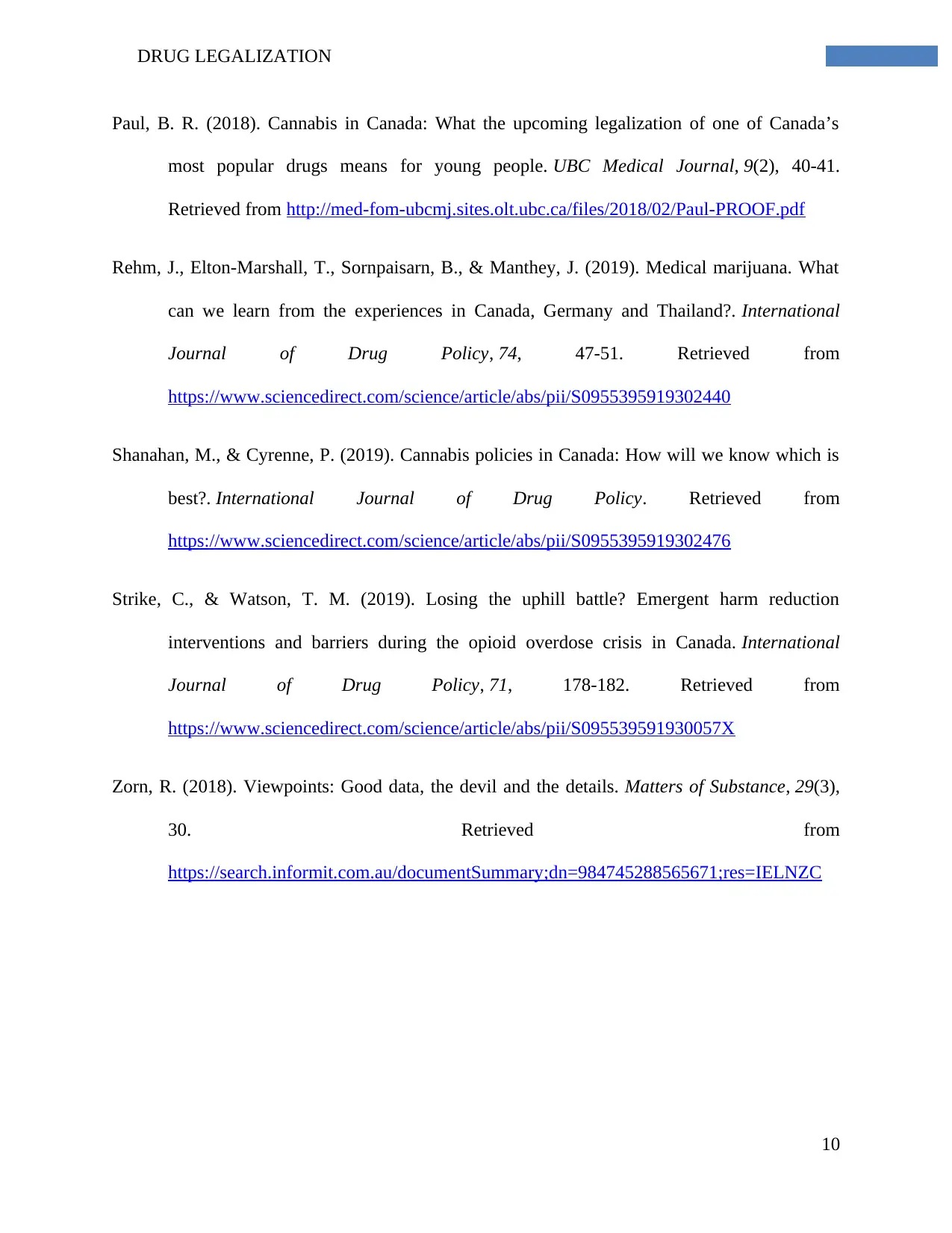
DRUG LEGALIZATION
Paul, B. R. (2018). Cannabis in Canada: What the upcoming legalization of one of Canada’s
most popular drugs means for young people. UBC Medical Journal, 9(2), 40-41.
Retrieved from http://med-fom-ubcmj.sites.olt.ubc.ca/files/2018/02/Paul-PROOF.pdf
Rehm, J., Elton-Marshall, T., Sornpaisarn, B., & Manthey, J. (2019). Medical marijuana. What
can we learn from the experiences in Canada, Germany and Thailand?. International
Journal of Drug Policy, 74, 47-51. Retrieved from
https://www.sciencedirect.com/science/article/abs/pii/S0955395919302440
Shanahan, M., & Cyrenne, P. (2019). Cannabis policies in Canada: How will we know which is
best?. International Journal of Drug Policy. Retrieved from
https://www.sciencedirect.com/science/article/abs/pii/S0955395919302476
Strike, C., & Watson, T. M. (2019). Losing the uphill battle? Emergent harm reduction
interventions and barriers during the opioid overdose crisis in Canada. International
Journal of Drug Policy, 71, 178-182. Retrieved from
https://www.sciencedirect.com/science/article/abs/pii/S095539591930057X
Zorn, R. (2018). Viewpoints: Good data, the devil and the details. Matters of Substance, 29(3),
30. Retrieved from
https://search.informit.com.au/documentSummary;dn=984745288565671;res=IELNZC
10
Paul, B. R. (2018). Cannabis in Canada: What the upcoming legalization of one of Canada’s
most popular drugs means for young people. UBC Medical Journal, 9(2), 40-41.
Retrieved from http://med-fom-ubcmj.sites.olt.ubc.ca/files/2018/02/Paul-PROOF.pdf
Rehm, J., Elton-Marshall, T., Sornpaisarn, B., & Manthey, J. (2019). Medical marijuana. What
can we learn from the experiences in Canada, Germany and Thailand?. International
Journal of Drug Policy, 74, 47-51. Retrieved from
https://www.sciencedirect.com/science/article/abs/pii/S0955395919302440
Shanahan, M., & Cyrenne, P. (2019). Cannabis policies in Canada: How will we know which is
best?. International Journal of Drug Policy. Retrieved from
https://www.sciencedirect.com/science/article/abs/pii/S0955395919302476
Strike, C., & Watson, T. M. (2019). Losing the uphill battle? Emergent harm reduction
interventions and barriers during the opioid overdose crisis in Canada. International
Journal of Drug Policy, 71, 178-182. Retrieved from
https://www.sciencedirect.com/science/article/abs/pii/S095539591930057X
Zorn, R. (2018). Viewpoints: Good data, the devil and the details. Matters of Substance, 29(3),
30. Retrieved from
https://search.informit.com.au/documentSummary;dn=984745288565671;res=IELNZC
10
1 out of 11
Your All-in-One AI-Powered Toolkit for Academic Success.
+13062052269
info@desklib.com
Available 24*7 on WhatsApp / Email
![[object Object]](/_next/static/media/star-bottom.7253800d.svg)
Unlock your academic potential
Copyright © 2020–2026 A2Z Services. All Rights Reserved. Developed and managed by ZUCOL.


